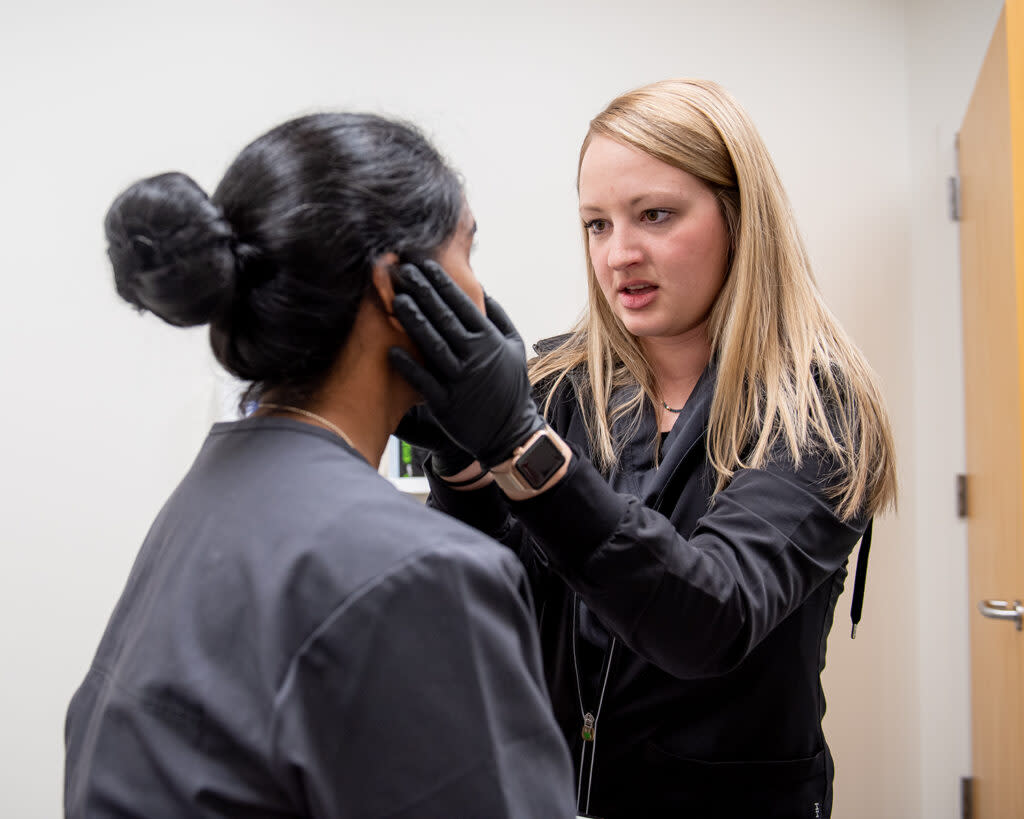First graduates of Kansas State University physician assistant program aim to fill health care gaps

Taylor Niemeier, a student in the Kansas State University physician assistant studies program, practices examination skills on fellow student Swathi Punreddy. Students learn about and practice hands-on examination skills during the first 12 months of the 27-month program. (Kansas State University)
MANHATTAN – The first graduates from Kansas State University’s physician assistant master’s program hope to help close health care gaps in the state.
The inaugural cohort of more than 30 students received training for 12 months in the classroom and 15 months in clinical rotations at regional hospitals and clinics.
Taylor Niemeier, a physician assistant student from Gove who graduated this spring, plans to return to northwest Kansas for a job with a local health care provider.
“As a class, we were able to help change and mold the program to fit the needs of students,” Niemeier said. “We worked with faculty to make this program successful, and we were able to make an impact by bettering the profession and helping it grow.”
Program director Gwen Ferdinand-Jacob said the first class “set the standard” for the program.
Ferdinand-Jacob was hired by K-State administrators in 2018 to build the program from scratch, out of an observed need by university officials for more medical representation and access across Kansas. She told the Manhattan Mercury in 2022 that 95 of the state’s 105 counties don’t have adequate rural access to health care, specifically behavioral health and medicinal psychology services.
A physician assistant studies program was created and implemented to educate and prepare medical professionals who may not have the advanced knowledge of physicians but would still receive intense training to complete most medical tasks while under the supervision of a physician.
Amy Fitzgerald, academic director of the program, said in a statement that a physician assistant, or PA, can help “relieve, but not replace,” the main doctor, especially following medical worker burnout from the COVID-19 pandemic and general physician shortages. Fitzgerald said the goal of PA programs like the one at K-State is to “train broadly and teach responses” to the common injuries and illnesses health care workers encounter, such as broken bones and blood sugar checks for diabetics.
Ferdinand-Jacob told the Mercury in 2022 that she, along with other university officials, visited health care facilities across Kansas to find clinical sites for students to complete their second-year rotations. Students were able to receive hands-on training with trauma patient simulators in mock exam rooms and virtual 3D anatomical dissection tables.
K-State instructors also focused on teaching students in the program to approach their jobs with empathy for their patients.
“It’s easy to teach the science, because that is often either right or wrong,” Ferdinand-Jacob said. “It can be difficult to teach the compassion and care needed to excel as a PA, but this cohort has really developed and grown in those skills these past 27 months.”
Before moving to northeast Kansas in 2018, Ferdinand-Jacob lived in Tennessee and worked in family medicine. She served 22 years in the Army and retired with the rank of captain.
She was a medic in Korea before hurting her knee and taking a visit to the emergency room. She met a physician assistant, which inspired her to pursue a career as a PA specific to Army airborne personnel.
Out-of-state students are part of the inaugural class. Many are still completing their national certifications.
Tavi Garcia, a PA student from the farm community of Jalisco, Mexico, said he appreciated the one-on-one opportunities he had with professors. Garcia is preparing to work at a rural health center in Idaho after helping underserved populations in Kansas.
“Through the program, I learned how to really work well with patients and recognize what I could do to help them medically,” Garcia said.
The post First graduates of Kansas State University physician assistant program aim to fill health care gaps appeared first on Kansas Reflector.

